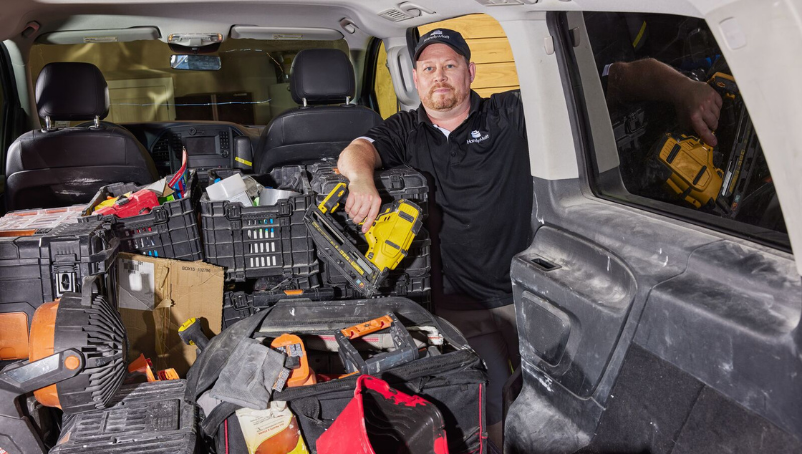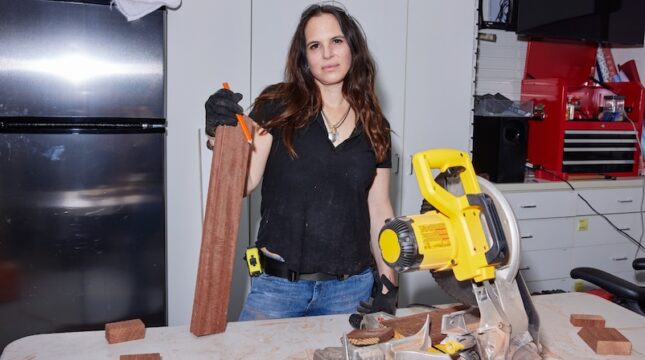How to get a handyman license in Ohio
You won’t need an Ohio handyman license since this license option does not exist, so there are no handyman license requirements. Ohio only issues contractor licenses at the state level for the following specialty trades:
- Electrical
- HVAC
- Hydronics
- Plumbing
- Refrigeration
You must complete the following steps to get your contractor license from the Ohio Construction Industry Licensing Board (OCILB).
Submit your application
Fill out the contractor license application. You may only apply for one of the five available specialty trades. Your application must be notarized and include a payment for the $25 application fee.
Complete a background check
Once you receive your application approval, you must complete a state and federal background check. Visit a Webcheck location to get your report, then submit the results to the OCILB.
Take the licensing exams
You must pass two contractor licensing exams: a business and law exam and a trade exam for your chosen specialty. Both are administered by PSI, which provides a detailed bulletin to help applicants prepare for the tests. You need a score of 70% or higher to pass each exam.
Provide proof of insurance
Send the OCILB a copy of your examination results, a check for the $25 license fee and a certificate of liability insurance. You must have at least $500,000 in contractor liability insurance coverage.
Contractor license requirements
You must have at least five years of experience in your specialty trade to apply for an Ohio contractor license. This experience must take place immediately before the date of application and involve working under a licensed contractor on projects requiring a permit.
To prove your work experience, you must attach at least one permit for each of the last five years to your application and provide the license number for the contractor(s) you worked under. In addition, you must attach your W-2s for the past five years of working as an employee for the licensed contractor(s).
Alternatively, you may fulfill the work experience requirement if you’re a registered engineer in Ohio with three years of business experience in your specialty trade.
Ohio contractor license renewal
You may opt for one-year or three-year renewals as an Ohio specialty contractor. The following continuing education requirements apply:
- One-year renewal: 8 hours (up to 4 hours online)
- Three-year renewal: 24 hours (up to 12 hours online)
Contractor license reciprocity
Contractors who have passed a licensing exam in their specialty trade in certain states are eligible for license reciprocation:
- Kentucky: Electrical, HVAC and Refrigeration
- Louisiana: Electrical, HVAC, Refrigeration and Hydronics
- North Carolina: Electrical
- South Carolina: Electrical, HVAC and Plumbing
- Tennessee: Electrical, HVAC, Refrigeration, Plumbing and Hydronics
- West Virginia: Electrical, HVAC and Plumbing
What kind of insurance does a handyman need in Ohio?
Whether you work as a handyperson or a contractor, you need the right insurance to protect your business. Below, you’ll find some of the most common types of business insurance recommended for these professions in Ohio.
General Liability insurance
General liability insurance helps to protect your business in the event of work-related accidents or property damage. Many clients request proof of liability coverage before they agree to hire a handyperson or contractor.
In Ohio, you must maintain at least $500,000 in general liability insurance to have a specialty contractor license. The OCILB requires a certificate of insurance as proof of your coverage.
Workers’ Compensation insurance
Workers’ compensation insurance protects your business if one of your employees gets hurt on the job. It helps cover medical expenses, lost wages and other benefits and can mitigate financial losses if an employee files a lawsuit against you.
Ohio requires all employers to carry workers’ compensation insurance. If you have employees, you must either purchase workers’ comp through the Ohio Bureau of Workers’ Compensation state fund or qualify for self-insurance.
Tools and Equipment insurance
Tools and equipment insurance helps pay for repairs and replacements if your work gear is damaged or stolen. You may opt to add this coverage to your general liability insurance policy.
Commercial Auto insurance
Commercial auto insurance is important for handypeople and contractors who drive to different job sites for work. This insurance helps cover costs related to accidents, such as towing, repairs and rental reimbursement.
Commercial Property insurance
Commercial property insurance helps handypeople and contractors who rent or own building space for their business. This insurance helps cover costs if damage or vandalism affects the property or any inventory and equipment stored there.
How NEXT Insurance supports Ohio handypeople
NEXT makes it easy to get handyman insurance. Ohio business owners can use our affordable and convenient services to get necessary coverage and fulfill any insurance requirements for Ohio contractor licensing or registration.
To apply, simply start a quote from any computer or mobile device. It only takes minutes to review your options, choose your coverage and get a certificate of insurance. If you want to make changes to your insurance coverage or download additional COIs, you can just log into your online account.
Get an instant quote online today.
Do you want to work as a handyman in another U.S. state? Learn what states require handyman licenses in our guide to handyman license requirements.
This information has been provided as a service. It is correct and up-to-date to the best of our knowledge; however, it is in no way intended to offer legal advice and you must always consult with local authorities before you make any business decisions. Regulations and requirements may change at any time.







